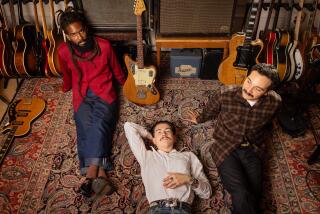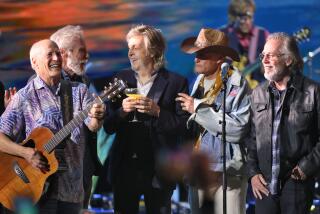Passing This Way Again : Seals & Crofts Are Trying Out New Material, Hoping There’s a Place for Them in the ‘90s
- Share via
One of Seals & Crofts’ biggest ‘70s hits was titled “Hummingbird,” and one of their album tracks advised listeners to “Milk the cows of gladness before they all go dry.”
Given that and Jim Seals’ and Dash Crofts’ adherence to the oft-misunderstood Bahai faith, “a lot of people were coming up and asking, ‘Do you guys worship birds or animals or something?’ ” Jim Seals says, laughing about it now.
Rather, Seals, who writes the songs, intended the critters and several other subjects that populate the duo’s ‘70s hits as metaphors, he says, as ways of expressing his observations about life and the tenets of his faith.
“Hummingbird,” for instance, was Seals’ metaphor for Baha Ulla, the man who founded Bahai in the 19th Century in Iran and who spent much of his life being persecuted for his teachings. The song’s plea, “Hummingbird, don’t fly away,” expresses Seals’ observation of “how each one of the world’s teachers when they come are misunderstood, and the first thing we do is strike out at them, behead them, hang them on a cross or whatever. Here mankind waits thousands of years for the coming of someone to help the unity of mankind, and then when he comes, they throw him in jail for 40 years and torture him. I was more or less trying to speak for the human race--presumptuous, I know--saying we were sorry.”
Fairly serious stuff for a couple of guys one rock encyclopedia dismisses as “the super-wimps of the ‘70s.” But although they are often lumped in with the other lightweights of the soft-rock era, Seals & Crofts usually had more to offer.
For one thing, they had the savvy to pack it in when the direction of popular music changed in the ‘80s.
But now the pair have reunited and are working on new material with a new band. Seals was speaking by phone this week from Toronto, where the group was rehearsing before a tour that will bring them to the Coach House tonight. “Around 1980,” he said, “we were still drawing 10,000 to 12,000 people at concerts. But we could see, with this change coming where everybody wanted dance music, that those days were numbered. We just decided that it was a good time, after a long run at it, to lie back and not totally commit ourselves to that kind of thing because we were like (fish) out of water.”
Seals had also become dissatisfied with the songs he was writing. Although they had a favorable deal with Warner Bros., “I was completely out of good material. What I had was so bad that we said: ‘Why spend the money to go in and (record) this, knowing that nobody’s going to like it, and we’re not pleased with it?’ If it isn’t something you respond to yourself, you can’t get that excited about doing it for others.”
As school chums growing up in rural Texas, Seals and Crofts found there wasn’t much there to get excited about except music. “When I was a kid , we didn’t have a whole lot around--we had to send off for our clothes in the mail--so we’d play music for entertainment,” Seals said.
“And Texas is a strange country. You can’t really put your finger on it, but it allows you to grow up using your imagination. I think any kind of isolation causes you to want to do something. You sit there and wonder what it’s like on the other side of the world.”
They did get to see a bigger chunk of the planet when they joined the Champs in 1958. Although neither of them played on the monster hit “Tequila,” its success kept them and the other members of the Champs touring for years. After they left the Champs and moved to L.A. in the ‘60s, they found work in the recording studios. Seals even had a brief career as a pop vocalist, waxing a single he recalls as being heavily influenced by Ritchie Valens.
It was while they were staying with their manager in Hollywood in 1966 that Seals & Crofts were introduced to the Bahai religion. “She and her family were Bahai, and they’d have these fireside gatherings at their house on Friday night. There were street people, doctors, university teachers and everybody there. And the things they talked about, I couldn’t even ask the question let alone give the answer: the difference between soul, mind and spirit, life after death. We’d discuss things sometimes until 3 in the morning.”
Bahais profess a universal faith--that is, they are dedicated to promoting world peace, the unity of all religions and people, equality between women and men, and the abolition of all forms of prejudice.
“It was the only thing I’d heard that made sense to me, so I responded to it,” Seals said. “That began to spawn some ideas to write songs that might help people to understand, or help ones who maybe couldn’t feel anything or were cynical or cold. Lyrically, I think music can convey things that are hard sometimes for people to say to each other. But through a song, through someone else’s eyes, they can see it and it’s not so much a confrontation.”
But intentions don’t always have their desired effects: The 1974 song and concept album “Unborn Child” thrust Seals & Crofts into the abortion controversy. “Unborn Child,” Seals said, “was really just asking a question: What about the child? We were trying to say, ‘This is an important issue,’ that life is precious and that we don’t know enough about these things yet to make a judgment.
“It was our ignorance that we didn’t know that kind of thing was seething and boiling as a social issue. On one hand we had people sending us thousands of roses, but on the other people were literally throwing rocks at us. If we’d known it was going to cause such disunity, we might have thought twice about doing it. At the time it overshadowed all the other things we were trying to say in our music.”
With that experience in mind, Seals says he is having second thoughts about resurrecting their 1973 hit “We May Never Pass This Way (Again)” because it contains lyrics praising Columbus’ voyage.
“The song was written a long time ago, and when I went to school, I was taught that Columbus was a good guy. I never really stopped to think about the controversy that’s developed over him recently. The song wasn’t intended to glorify a slave owner, it was addressing the kind of courage it took for him to go out at a time when they thought the world was flat. Whether they did it for greed or ignorance or whatever, they did it. Now we’ll have to change the lyrics. God knows, I know the Indians and aboriginal peoples are the backbone of the world, and it was not intended to belittle them in any way.”
During the duo’s decade-long hiatus, Seals moved to Costa Rica “just to get out of L.A. and try to make a musical transition.” Crofts did studio work in Nashville, where Seals’ younger brother Dan has also made quite a name for himself.
The pair are now working up material with a quintet of Canadian musicians. Their short West Coast tour, including tonight’s Coach House date, was scheduled to help the band and new songs develop “organically” on the stage. (They’ll also play their hits.)
“We’re still experimenting with it, but I’d call most of the new songs message-oriented music with a beat. We have one called ‘Passengers’ about how life is moving and we’re the passengers. One called ‘Titans’ is about how men are always perceived to be strong, while it’s women who (in reality) can be the strong and self-subsisting ones.”
As for his musical influences of late, Seals said: “I listen to just about everything I can get my hands on, but the two people who have affected my musical thinking the most in the last 10 years are Sting and Peter Gabriel. I had a chance to spend a few days with Peter in Costa Rica, and just the way he went about doing his album was unique--it had nothing to do with trying to get a commercial success.” Seals also particularly likes the Neville Bros., the Chieftains and even “parts of the new Van Halen album.”
And he’s hoping there’s a place for Seals & Crofts as well in today’s music scene.
“Right now, outside of rap and country there doesn’t seem to be any real force out there in music. Maybe I’m out of touch or something, but I hear very few groups that say or contribute something. I hope we can do something new: We can’t get out of our element, but we can add things to it to make it better. We might not draw flies, I don’t know, but a lot of people said they’d like to hear what we come up with.”
Seals & Crofts and Tom Kell play tonight and Sunday at 8 p.m. at the Coach House, 33157 Camino Capistrano, San Juan Capistrano. Tickets: $29.50. Information: (714) 496-8930.
More to Read
The biggest entertainment stories
Get our big stories about Hollywood, film, television, music, arts, culture and more right in your inbox as soon as they publish.
You may occasionally receive promotional content from the Los Angeles Times.










